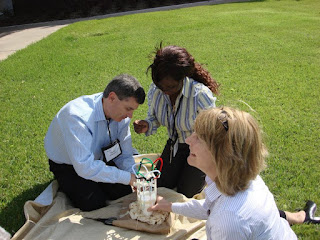7 Ways To Enhance Organizational Culture
As a young employee I was transferred to work in the Global HR office, Houston Texas, USA. I wasn’t the only person to arrive in this new office space the group had changed significantly due to reorganization and many of us were from different countries working together for the first time.
My boss, the Senior
Vice President, HR, asked me to help her with some unusual HRIS projects.
First, I organized an ugly tie contest. Next, we created a puzzle where
everyone told me their fantasy identity (who they would be if they could be
anyone) and I created a quiz. People had several days to try to figure out who
was who. This culminated in a party and the revealing of all the secret
identities (and prizes for those who had done the best guessing).
Along with many other events, we eventually instituted the first HR Project. This project was called iConnect (hey, this was 2009 /2010).
At that time I knew what was happening and why it was important to the development of the culture in the organization. But I didn't understand it the way I do now. . .☺
For a whole variety
of reasons, organizational culture is important to the health or viability of
any organization.
It is one thing to
know something is important. It is another thing entirely to know what to do
about it. This article will give you some specific things you can do to act on
the importance of your organizational culture.
Here are some important things you should know:
1. Get Help:
Wherever you sit in the organizational structure or hierarchy you can impact organizational culture in a positive (or negative but why would you want to do that?) way. Admittedly, if you are in a position of leadership, it might be easier, but we can all have an impact.
But we cant do it alone. Form a team of like minded, interested and enthusiastic people, and get them on board with developing and enhancing your culture.
2. Get A Vision:
Get your team to discuss the current culture. Define the parts of the culture that are already great and need to be supported. And honestly determine where the culture could use some polishing. Then create a vision of the culture you want to create, taking into account the entire current picture the warts and the beauty marks.
3. Get Strategic:
Your team will recognize that this is important you've picked people who already understand that and you have developed a deeper understanding as you created a vision of a desired future culture. Help everyone understand – the team and organizational leadership that this isn't a band-aid, quick fix; but an ongoing, strategic intention to build a more attractive culture that fits the needs of the organization.4. Get People Excited:
Chances are your culture team will be excited. If not, get them excited! Help the team recognize that not everyone else in the organization is going to think that these efforts are worthwhile immediately. Remember that enthusiasm is contagious. Do what you can to keep the enthusiasm of your team high. If their excitement falters, remind them of the vision they created to re-invigorate them.
5. Get A Champion:
That person
may be you, or it may be someone else on the team. In my case, I took on the champion for West African. While a moniker might not be necessary, a point
person, whether anonymous or not, is important. Culture change is like any
other change it requires champions. The champion needs to be someone who is
passionate about creating the new culture. As in my case, this was a
perfect role for a young energetic person like me, but don't assign the role. The best
champions will rise up and select themselves.
6. Get Started:
Yes, I have listed the first five suggestions in a chronological order. But that doesn't mean you can't do something today, as soon as you finish reading this article or right now. You already know some things that need to change in your culture, so role model one of them starting immediately. Maybe your first step is to invite a couple people to lunch that you think might want to be on your team. Whatever your first step is do it.
7. Get momentum on your side:
Any change will have a greater chance of success with momentum.
Don't form your team today if you don't think you'll be able to get them going
quickly. Don't think of this something that can be done in a couple of weeks. A
single event that you hope will permanently change the culture – wont. In fact,
it might have the opposite effect entirely. Get started but be committed to
building momentum and staying with it. It will be one of the most rewarding
efforts you and your team will ever engage in.
I haven't given you specific cultural events to try. Why? Because I don't know what kind of changes you want to create. In my case we were trying to create higher levels of HR Information System and more fun in the workplace. You may have that and may want to enhance your culture in completely different ways. You and your team will figure out what to do.
This list is meant to help you figure those things out
for yourselves.
These seven things
are by no means a complete list but they are a great place to start. And
getting started is the most important next step of all.










